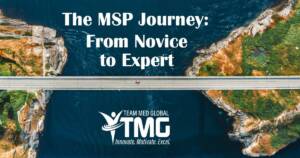 Embarking on a career as a Medical Services Professional (MSP) is a rewarding yet challenging journey. Whether your focus is on credentialing, provider enrollment, or licensing, the path from novice to expert is filled with learning opportunities, growth, and professional development. Here’s a roadmap to help guide you through this dynamic world and achieve mastery in your specialty.
Embarking on a career as a Medical Services Professional (MSP) is a rewarding yet challenging journey. Whether your focus is on credentialing, provider enrollment, or licensing, the path from novice to expert is filled with learning opportunities, growth, and professional development. Here’s a roadmap to help guide you through this dynamic world and achieve mastery in your specialty.
Starting Your Journey: The Novice Stage
As a novice MSP, your journey begins with understanding the basics. This stage is all about building a strong foundation, regardless of whether you are focused on credentialing, provider enrollment, or licensing.
Key Focus Areas:
Credentialing Fundamentals: Learn the essential steps in credentialing healthcare providers, including primary source verification, compiling credentials files, and understanding accreditation requirements.
Provider Enrollment: Familiarize yourself with the enrollment processes for various insurance plans, Medicare, and Medicaid.
Licensing: Understand the requirements and processes for obtaining and maintaining state medical licenses for providers.
Tips for Success:
Seek Mentorship: Find a seasoned MSP in your specialty to guide you through the initial stages. Their experience can provide invaluable insights and practical tips.
Continuous Learning: Enroll in TMGU training programs, such as Foundations of Credentialing, Foundations of Provider Enrollment, or the Certified Physician Licensing Specialist course. Attend workshops and read industry publications to stay updated on best practices and emerging trends.
Building Competence: The Proficient Stage
Once you’ve mastered the basics, it’s time to build on that knowledge and develop your competence. In the proficient stage, you’ll start to handle more complex tasks and take on additional responsibilities.
Key Focus Areas:
Advanced Skills in Your Specialty: Dive deeper into complex cases within your focus area, such as handling adverse actions in credentialing, navigating complex payer requirements in provider enrollment, or managing multi-state licensing.
Leadership Skills: Begin developing leadership skills by managing small projects, coordinating with other departments, and mentoring newer MSPs.
Technology Utilization: Learn to effectively use specialized software and digital tools to streamline processes and enhance efficiency.
Tips for Success:
Networking: Join professional organizations to connect with other MSPs, share experiences, and learn from peers.
Professional Certification: Consider pursuing certification relevant to your specialty, such as TMGU’s Executive MSP, Executive Provider Enrollment Professional or Certificate in Leadership Excellence to validate your expertise and enhance your career prospects.
Achieving Expertise: The Expert Stage
Reaching the expert stage is the culmination of years of dedication, learning, and professional growth. As an expert MSP, you’ll be seen as a leader and a valuable resource within your organization.
Key Focus Areas:
Strategic Leadership: Take on strategic roles within your organization, such as leading departmental initiatives, contributing to policy development, and participating in executive decision-making.
Quality Improvement: Drive quality improvement projects that enhance processes in your specialty, reduce errors, and improve overall efficiency.
Industry Contribution: Share your expertise by speaking at conferences, writing for industry publications, and participating in professional forums and committees.
Tips for Success:
Mentor and Educate: Give back to the MSP community by mentoring new professionals, conducting training sessions, and sharing your knowledge and experiences.
Stay Innovative: Keep up with technological advancements and industry changes. Embrace new tools and methodologies to continually improve your skills and processes.
The Continuous Journey
Even as an expert, the journey doesn’t end. The healthcare landscape is constantly evolving, and so too must MSPs. Stay committed to lifelong learning, seek out new challenges, and remain adaptable to changes in the industry.
Lifelong Learning
Ongoing Education: Attend advanced training sessions, pursue higher education opportunities, and stay engaged with industry research and developments.
Adaptability: Be open to new roles and responsibilities that push your boundaries and expand your expertise.
The journey from novice to expert MSP is a rewarding path of continuous learning and growth. Each stage offers unique opportunities to develop your skills and contribute to your organization. Whether you specialize in credentialing, provider enrollment, or licensing, embrace each step, stay committed to your professional development, and celebrate your achievements along the way. Your dedication as an MSP not only advances your career but also plays a crucial role in the success of the healthcare system.
TMG University is committed to offering education that supports your ongoing success. Our courses are designed to provide you with the knowledge and skills you need to excel. Learn more here.

